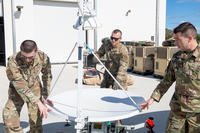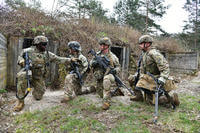Women in the military could have a higher risk of giving birth to low-weight babies than their civilian counterparts, according to a scientific review published this week.
The review, which analyzed 21 separate studies of pregnancies in the U.S. military from 1979 to 2023, found that about two-thirds of the studies concluded that active-duty servicewomen may be at heightened risk of having babies with a low birth weight.
Still, the review did not find clear evidence that servicewomen have an increased risk of stillbirth or premature births.
Read Next: Navy Chief Petty Officer Convicted of Attempted Espionage at San Diego Court-Martial
The review, which was written by U.K. researchers and published in the journal BMJ Military Health, "highlights a need for female-specific research in other armed forces" beyond the U.S. military, the authors concluded.
"From the service perspective, promoting the health of mother and baby can contribute to operational effectiveness through faster return to duty, retention in the service and increased deployability," the researchers, led by Kirsten Morris of the London School of Hygiene and Tropical Medicine, wrote in the review published Monday. "Hence, improved pregnancy outcomes are important both for the families concerned and for the service as a whole."
While the researchers were focused on the implications of the review on militaries outside the United States, U.S. policymakers have also been concerned about maternal health in the military in recent years.
Concern in the U.S. has focused both on how the unique stressors of military life could affect pregnancy as well as on a lack of access to maternity care within the military health system.
Staffing shortages in general at military treatment facilities have left expectant mothers struggling to find a doctor. The issue has been a particular worry in areas where local doctors don't have the capacity to handle an influx of military patients, as well as for those stationed overseas where treatment may differ from what U.S. patients expect.
A 2023 study also found that patient satisfaction ratings for obstetric care in military health facilities are low compared to medical and surgical care.
Meanwhile, evidence has accumulated showing the stress of military life hits pregnant service members particularly hard. For example, a 2022 Government Accountability Office report found service members face mental health conditions during the perinatal period at a higher rate than civilians.
U.S. lawmakers have proposed fixes, including mandating a comprehensive study of access to maternity care and creating a perinatal mental health program. Women's health was also one of the specialty areas of health care that a bipartisan House panel on military quality-of-life recently recommended taking steps to increase access to.
The scientific review released Monday also noted that a growing body of research shows that stress both before conception and during pregnancy is associated with birth complications, including low birth weight and premature birth.
Low birth weight is considered anything less than 5 pounds, 8 ounces, and is associated with health concerns, including breathing issues, developmental disabilities and chronic diseases later in life, according to nonprofit maternal health organization March of Dimes.
The 21 studies that the researchers analyzed covered the experiences of more than 650,000 U.S. servicewomen, according to the review.
In addition to finding that U.S. service members in general appeared at greater risk of having babies with low birth weight than civilians, the researchers noted both studies they examined from the Air Force indicated a higher prevalence of low birth weight specifically in that service.
The researchers also stressed several limitations with their review, including that many of the studies didn't have a control group and relied on national statistics for comparison, and that few of the studies looked at other risk factors such as smoking habits.
Still, the researchers concluded that their findings could be used to "inform military maternity pathways and policies in ways that safeguard mothers and their babies while enhancing military readiness."












